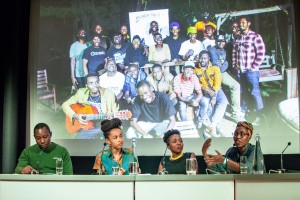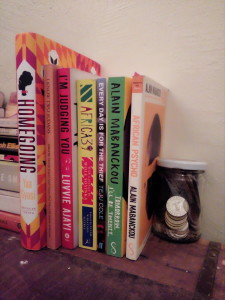
I was pleasantly surprised to feel quite so at ease in London on my recent trip there for the Africa Writes festival. I’m quite the unlucky traveller who always returns with a fun tale from the road (read about misadventures in Garissa and Zanzibar).
While I did end up losing my phone on the Uber from the airport and had to rely on email, explicit instructions scribbled on paper and the kindness of strangers, I really enjoyed the city.
This is largely due to the sunny weather and the vibrant community of black and brown folks whose hypervisibility had a calming effect on me. The fact that I saw a lot of older black people made it feel more lived-in than Berlin and Amsterdam—the two cities I’ve been to abroad. I remember standing at a bus stop in North London watching an elderly woman in twist-outs and a nightgown walk past and thinking, “That could be my auntie”.
The festival itself was also quite nearly a sea of blackness, especially during the opening event, the R.A.P. Party. This well-dressed crowd gathered at the British Library to listen to rhythms and poetry. A cross-section of London’s finest poets performed pieces that were inspired by, were a response to or reminded them of classic Hip Hop tracks—although technically, and fittingly, Jamaican poet Kei Miller requested a dancehall track.
The breaks in-between performances was a chance to get down surrounded by tonnes of tomes and fly folks. DJ Sid on deck had all the best tunes and security literally had to chase people out once the event ended.

The next day was very busy for Jalada. On a panel moderated by Afrikult’s Zaahida Nabagereka, fellow Jalada Festival co-curator, Richard Oduor and I presented a showcase of the 28-day tour. We shared images, screened a short documentary and shared insights alongside Louise Umutoni of Kigali-based publishing house, Huza Press, one of our fantastic partners. Jalada, Huza Press and Africa Writes won the first round of a “new audience, new art” (nAnA) grant offered by the British Council to support the festival’s Rwanda and UK legs.
I’m quite grateful for the warm reception, curiosity and support from the audience as we spoke about lessons learnt and the impact of the work we did. Perhaps the best part was the Kenyans in the audience hanging back after the panel to congratulate us and chat in Swahili and Kikuyu.
We had to make a quick dash to our next panel, the launch of Jalada o5/Transition 123 Fear Issue that our Collective produced together with the Harvard-based journal. With Deputy Editor NovuyoTshuma joining us via Skype, celebrated editor and Jalada Board of Trustee member, Ellah Allfrey chaired a conversation with Transition’s Sara Bruya, writer Ike Echeruo plus Richard and I.

I got to read an excerpt from my essay, Damned. Gifts and answer some questions about it. My personal take-away from the panel was recognizing that there are many artistic voices within me; the semi-retired poet, the visual storyteller (photography and film), the journalist that all add a different layer to my writing.
Soon after, I was off to setup our next event, a kanga exhibition. Curated by writer, kanga researcher and enthusiast, Amanda Lichtenstein in Zanzibar, the exhibition featuring 28 popular kanga designs, had travelled to Mombasa and now, London. There it was under the care of writer Ndinda Kioko, a member of Jalada whose essay The Kanga is Present inspired the exhibition, and historical researcher Chris Spring.
Appreciation for and interest in the fabric’s textures, colours, designs and messages were palpable. After all, the kanga is believed to be the “physical manifestation of the challenges faced by Swahili women since the abolition of slavery in East Africa in the 19th century and their struggle to assert the legitimacy of their claim to a free Swahili identity”.
Some audience members even brought their own kangas. Ndinda, myself and visiting Kenyan performer scholar and kanga enthusiast, Mshai Mwangola translated the statements and suggested implied meanings. Ndinda then led the room in a creative writing session, much like what we did in Zanzibar, where audiences were invited to craft new kanga sayings.

The final Jalada event was a translation roundtable on Sunday. The Collective was represented by Richard and our Managing Editor, Moses Kilolo via Skype alongside Victoria Bulley, Abdulai Silá, Jethro Soutar with Dr. Martin Orwin as chair.
The highlight of the festival for me was listening to Francophone Congolese writer, Alain Mabanckou speak about writing in exile, championing for the visibility of African authors, especially women, and drawing from his childhood, family and memories to write his works of fiction. He has an ambition to make his late mother the most visible maternal figure in African fiction. At the writers’ dinner later, Alain signed a few books. True to his sapeur leanings, he sketched flamboyant faces, each different and delightful, alongside his signature.
The next evening, Richard and I attended the 2017 Caine Prize for African Writing dinner. It was there that I had a really weird conversation with a gentleman who worked in a high-ranking position of a religious organization.
Old white man: Do they speak English in Kenya?
Me: Yes. We were, after all, colonized by the British. Do they speak Swahili in America?
Old white man: *blink* *blink* Yes.
Me: Interesting. *sips water* *slips away*
That aside, the event was lovely. I was seated next to Afrikult’s Marcelle Akita and Ugandan poet Nick Makokha and got to meet Nigerian author Lesley Nneka Arimah (who I was rooting to win!) The award went to seasoned Sudanese writer Bushra al-Fadil who gave a spirited speech on the importance of teaching the younger generation the importance of education.
After such a hectic first four days (I arrived on Friday, same day at the R.A.P. party), I took some time to relax then went seeking adventure and great conversations. I got to watch my friend, Inua Ellams’ witty and stirring play exploring black masculinity, Barber Shop Chronicles. Using a combination of research and real conversations, Inua took audiences inside these hallowed spaces in Kampala, Lagos, Accra and Johannesburg where men congregated to discuss politics, football and relationships.

Keeping true to my tradition of watching a film in every city I visit, saw The Red Turtle at The Prince Charles cinema. It was silent animation about a shipwrecked man whose every attempt to escape his lonely island is thwarted by a giant red turtle. I’m still thinking about this one, to be honest. Given how strongly I feel about consciously shaping my world, I don’t know if I’m fully with the man’s ultimate decision. That said, I did enjoy the beautiful visuals and what he came to find when he chose to stay.
Big shout out to my lovely hosts, Phoebe Boswell and Mutsa and Mnatsi Marau and ofcourse Angela, Amal, Arlene, Caitlin, Ellah, Freddie, Kore, Lizzy, Marcelle, Ndinda, Oti and Yovanka, for all the warmth, good cheer and hospitality.
P.S. The tube is my absolute favourite thing about London. Kenya make some here?
Photo credits: Ivan Gonzalez, Kore and I
Leave a Reply